#writing college essays
Explore tagged Tumblr posts
Text

Turbo Granny blunt rotation WIP
#for a class assignment due todayyyy#still gotta edit the fucking 600 word description yuck#and write another essay for a different class#and read another manga chapter for that class#and do makeup readings/hw for my mesoamerican art history class plus the readings/hw for this week#and i haven't been sleeping more than like 4 hrs a night cause i started a new medication#which also gives me evening heart palpitations lol#and im skipping class to finish as much as i can#but eventually ill clean this up and color it!#eventually#hopefully#next term i snagged a spot in the only 2D animation class this stupid college has ever had#and set up my schedule to only take up 3 days despite having 4 classes#and hopefully 2 of said classes will be pretty easy#ones a 1x a week gardening thing and the others an online design class#i wanted to leave lots of time to animate#dandadan#turbo granny#animation#fanart#dandadan fanart#character turnaround#art#digital art#artists on tumblr#trans artist#my art#my animations#krita#tw drugs
906 notes
·
View notes
Text


01.04.2025—happy April!! still in a major depressive slump, not thriving. enjoy some old photos while i get out of whatever this is
#studyblr#studyspo#study notes#study motivation#bullet journal#study blog#athenastudying#stationery#studying#study#heydeguy#heycoral#study spaces#study space#studysthetics#heyscholarly#heydel#university#college#gradblr#essays#writing#notes#heystudyblr#heysprout#heybenni#heyblake#heynesi#heykenzie#heymissawesome
316 notes
·
View notes
Text
jing yuan, who loves when you’re wearing his clothes, and you return them to him. it’s so domestic and simple but he craves it. (gn reader, not a serious drabble.) reader is characterized as smaller than jy, interpret as you wish.
wc: 470

The clothes smell like you, of course. The laundry detergent you bought, your shampoo and the little scent beads you like to put in the washing machine. He doesn’t mind the musk that lingers on his old shirts after you clean the whole house, no of course not. Jing Yuan adores smelling your musk, lotion and conditioner melding together and melting into his shirt.
You go out to buy new scent beads every other month, a tiny little jar of them. Jing Yuan swears to anyone who listens that you’re doing this on purpose. Mixing your shampoo and lotion to match with the scent beads, changing the fabric softener to mess with his head (and laundry). He laments this to Fu Xuan, Qingzu, and Yanqing, who all beg you to stick to one routine before the General loses his sanity (of course, everyone groans and ignores him. they’ve had enough of his marital escapades, and they just tell him to marry you again if he’s this smitten. Thus, after a decade of marriage, Jing Yuan has rewritten his vows.) He likes these little variances in his routine, the little harmless surprise that keeps him on his toes.
(He swears it's just because you picked it out. You know it's because it reminds him that there's finally a home for him to return to.)
"I'm back, do you know what the others said during the meeting, they were planning on handing off more paperwork, but I insisted mimi and you would--" He stops in his tracks. This must be unfair. Divine Punishment? Did he anger Lan? his ancestors?
Jing Yuan sees you wearing nothing but some socks, his shorts and t-shirt (both of which hang off of your smaller frame). He runs over, pace quickening.
You yelp quietly, backing away before he pounces onto you, bearing all of his weight onto you. He can't help it, you're so cute wearing his outfit, doing laundry and making dinner.
“You smell so good.” he buries his face into your neck, inhaling the sun on your skin, lotion he bought for you, and the conditioner you've taken from his stash.
“And you smell icky.” You push him off gently, but his arms only tighten. He just got back from work, and he reeks of sweat. But you can’t ignore how your heart races whenever he gets up to these antics, and you can’t help but indulge in his whims.
This is a regular habit. He barely removes his armor before running to you, and clings to you like a sullen child, asking about dinner and how his darling and mimi have been. You can only sigh and pat his head while he recharges in your lap (or, in Yanqing’s words: naps.)
"thank you, for everything," He whispers into your ear, "You're doing great, sweetheart."

a/n: I was talking to a coworker abt how the only thing that brings me joy now is a 2d man (jy) and buying new scent beads/laundry scent boosters or sample perfume. then I had this idea. also that ending bit :,) sending good vibes to all with my first fic of the new yr!
#hsr x reader#honkai star rail x reader#koi♪#don't take this too seriously? I just got bored and thought of jy who rlly likes your scent#and domesticity#and domecisity#honkai star rail#jing yuan x reader#I do think that whenever it comes down to it#Jing Yuan is someone who just wants to build himself a home. he's experienced a lot of change in his life time#probably more than an average xianzhou native has#so the idea of settling down + his spouse doing these domestic tasks#really gets to him on some days#esp after long meetings? curling up to his darling spouse is a treat#idk#he makes me feel very mushy on some days.#jing yuan fluff#almost the same length as my college essay (idk here it was a min 500 wc) and so much easier to write.#even tho it took me two days
383 notes
·
View notes
Note
Hello. Sorry if this a stupid question u can ignore if u want.
How can someone get better at media analysis? Besides obviously reading a lot.
Im asking this bc im in a point where im aware of my own lack of tools to analyze stories, but i don't know where to get them or how to get better in general. How did you learn to analyze media? There's any specific book, essay, author, etc that you recommend? Somewhere to start?
I'm asking you because you are genuinely the person who has the best takes on this site. Thank you for you work!
it sounds like a cop-out answer but it's always felt like a skill I acquired mostly thru reading a ton, and by paying a lot of attention in high school literature classes. because of that I can't promise that I'm necessarily equipped to be a good teacher or that i know good resources. HOWEVER! let me run some potential advice to you based on the shit i get a lot of mileage out of
first off, a lot of literary analysis is about pattern recognition! not just pattern recognition in-text, but out-of-text as well. how does this work relate to its genre? real-world history? does it have parallels between real-life situations? that kind of thing.
which is a big concept to just describe off the bat, so let me break it down further!
in literature, there is the concept of something called literary devices - they are some of the basic building blocks in how a story is delivered mechanically and via subtext. have you ever heard of a motif? that is a literary device. it's a pattern established in the text in order to further the storytelling! and here is a list of a ton of common literary devices - I'd recommend reading the article. it breaks down a lot of commonly used ones in prose and poetry and explains their usage.
personally, I don't find all the literary devices I've learned about in school to be the most useful to my analytical hobbies online. motifs, themes, and metaphors are useful and dissecting them can bring a lot to the table, but a lot of other devices are mostly like fun bonus trivia for me to notice when reading. however, memorizing those terms and trying to notice them in the things you read does have a distinct benefit - it encourages you to start noticing patterns, and to start thinking of the mechanical way a story is built. sure, thinking about how the prose is constructed might not help you understand the story much more, but it does make you start thinking about how things like prose contribute to the greater feeling of a piece, or how the formatting of a piece contributes to its overall narrative. you'll start developing this habit of picking out little things about a text, which is useful.
other forms of in-text pattern recognition can be about things like characterization! how does a character react to a certain situation? is it consistent with how they usually behave? what might that tell you about how they think? do they have tells that show when they're not being trustworthy? does their viewpoint always match what is happening on screen? what ideas do they have about how the world works? how are they influenced by other people in their lives? by social contexts that might exist? by situations that have affected them? (on that note, how do situations affect other situations?)
another one is just straight-up noticing themes in a work. is there a certain idea that keeps getting brought up? what is the work trying to say about that idea? if it's being brought up often, it's probably worth paying attention to!
that goes for any pattern, actually. if you notice something, it's worth thinking about why it might be there. try considering things like potential subtext, or what a technique might be trying to convey to a reader. even if you can't explain why every element of a text is there, you'll often gain something by trying to think about why something exists in a story.
^ sometimes the answer to that question is not always "because it's intentional" or even "because it was a good choice for the storytelling." authors frequently make choices that suck shit (I am a known complainer about choices that suck shit.) that's also worth thinking about. english classes won't encourage this line of thinking, because they're trying to get you to approach texts with intentional thought instead of writing them off. I appreciate that goal, genuinely, but I do think it hampers people's enthusiasm for analysis if they're not also being encouraged to analyze why they think something doesn't work well in a story. sometimes something sucks and it makes new students mad if they're not allowed to talk about it sucking! I'll get into that later - knowing how and why something doesn't work is also a valuable skill. being an informed and analytical hater will get you far in life.
so that's in-work literary analysis. id also recommend annotating your pages/pdfs or keeping a notebook if you want to close-read a work. keeping track of your thoughts while reading even if they're not "clever" or whatever encourages you to pay attention to a text and to draw patterns. it's very useful!
now, for out-of-work literary analysis! it's worth synthesizing something within its context. what social settings did this work come from? was it commenting on something in real life? is it responding to some aspects of history or current events? how does it relate to its genre? does it deviate from genre trends, commentate on them, or overall conform to its genre? where did the literary techniques it's using come from - does it have any big stylistic influences? is it referencing any other texts?
and if you don't know the answer to a bunch of these questions and want to know, RESEARCH IS YOUR FRIEND! look up historical events and social movements if you're reading a work from a place or time you're not familiar with. if you don't know much about a genre, look into what are considered common genre elements! see if you can find anyone talking about artistic movements, or read the texts that a work might be referencing! all of these things will give you a far more holistic view of a work.
as for your own personal reaction to & understanding of a work... so I've given the advice before that it's good to think about your own personal reactions to a story, and what you enjoy or dislike about it. while this is true that a lot of this is a baseline jumping-off point on how I personally conduct analysis, it's incomplete advice. you should not just be thinking about what you enjoy or dislike - you should also be thinking about why it works or doesn't work for you. if you've gotten a better grasp on story mechanics by practicing the types of pattern recognition i recognized above, you can start digging into how those storytelling techniques have affected you. did you enjoy this part of a story? what made it work well? what techniques built tension, or delivered well on conflict? what about if you thought it sucked? what aspects of storytelling might have failed?
sometimes the answer to this is highly subjective and personal. I'm slightly romance-averse because I am aromantic, so a lot of romance plots will simply bore me or actively annoy me. I try not to let that personal taste factor too much into serious critiques, though of course I will talk about why I find something boring and lament it wasn't done better lol. we're only human. just be aware of those personal taste quirks and factor them into analysis because it will help you be a bit more objective lol
but if it's not fully influenced by personal taste, you should get in the habit of building little theses about why a story affected you in a certain way. for example, "I felt bored and tired at this point in a plot, which may be due to poor pacing & handling of conflict." or "I felt excited at this point in the plot, because established tensions continued to get more complex and captured my interest." or "I liked this plot point because it iterated on an established theme in a way that brought interesting angles to how the story handled the theme." again, it's just a good way to think about how and why storytelling functions.
uh let's see what else. analysis is a collaborative activity! you can learn a lot from seeing how other people analyze! if you enjoy something a lot, try looking into scholarly articles on it, or youtube videos, or essays online! develop opinions also about how THOSE articles and essays etc conduct analysis, and why you might think those analyses are correct or incorrect! sometimes analyses suck shit and developing a counterargument will help you think harder about the topic in question! think about audience reactions and how those are created by the text! talk to friends! send asks to meta blogs you really like maybe sometimes
find angles of analysis that interest and excite you! if you're interested in feminist lenses on a work, or racial lenses, or philosophical lenses, look into how people conduct those sort of analyses on other works. (eg. search feminist analysis of hamlet, or something similar so you can learn how that style of analysis generally functions) and then try applying those lenses to the story you're looking at. a lot of analysts have a toolkit of lenses they tend to cycle through when approaching a new text - it might not be a bad idea to acquire a few favored lenses of your own.
also, most of my advice is literary advice, since you can broadly apply many skills you learn in literary analysis to any other form of storytelling, but if you're looking at another medium, like a game or cartoon, maybe look up some stuff about things like ludonarrative storytelling or visual storytelling! familiarizing yourself with the specific techniques common to a certain medium will only help you get better at understanding what you're seeing.
above all else, approach everything with intellectual curiosity and sincerity. even if you're sincerely curious about why something sucks, letting yourself gain information and potentially learning something new or being humbled in the process will help you grow. it's okay to not have all the answers, or to just be flat-out wrong sometimes. continuing to practice is a valuable intellectual pursuit even if it can mean feeling a tad stupid sometimes. don't be scared to ask questions. get comfortable sometimes with the fact that the answer you'll arrive at after a lot of thought and effort will be "I don't fully know." sometimes you don't know and that can be valuable in its own right!
thank you for the ask, and I hope you find this helpful!
#narrates#thanks for the kind ask! i feel a little humbled by your faith in me aha#this may be a bit scattershot. its 2 am. might update later with more thoughts idk#nyway i feel like a lot of lit classes even in college don't tell you why they're teaching you things that might feel superfluous#hopefully this lays out why certain seemingly superfluous elements of literary education can be valuable#the thing esp about giving theses and having a supporting argument... its not just because teachers need to see an essay or whatever#the point is to make you think about a text and then follow thru by performing analysis#and supporting that analysis w/ evidence from the text#u don't have to write essays but developing that mindset IS helpful. support ur conclusions yknow?#anyway thanks again hope it's illuminating
215 notes
·
View notes
Text
AKAD — OIKAWA TOORU. gender neutral reader, fluff, no warnings (except maybe it may make you emotional?)
happy haikyuu day!! thank you furudate for changing my life. here’s something for oikawa cause he’s so so special to me and i love him (not romantically, despite this fic) so i hope i write for him MORE.
♫ AKAD (PAYUNG TEDUH)

“i think i’ll marry you someday” oikawa says suddenly.
you to turn your head his way in a fast motion, yet he continues to look up ahead and watch as the raindrops fall. the two of you sit idly on a bench, sheltered beneath the roof of a bus stop. the weather is cold, and all you can hear is mostly raindrops falling around you, striking the roof the two of you hide beneath. you think maybe that’s why he said it, convinced you wouldn’t hear.
“what?” you speak up, not wanting to ignore his words. he turns his head to you now, a knowing smile on his face — he seems well aware of his words. so you ask again, “what made you say that?”
“i was just thinking, it just came to mind how happy it makes me to be with you, walk with you, laugh with you,” he stops to chuckle. “it’s cheesy, i know. but i really wouldn’t mind continuing to experience all of that in the future” he explained.
the world felt like it was washing away slowly with every word he spoke, as if it flowed with the stream, down the drain. all you can seem to focus on now is oikawa.
he looks away again for a moment. “but of course if i’m going to far, or maybe you’re not interested, then it’s fine. i’ll still always be there for you in any way you want” he says genuinely, though almost sad. “just let me stay in your life, okay?”
you look away now, face reddening. “okay” you respond bashfully. “i wouldn’t mind marrying you either”
suddenly his head is on your shoulder, you almost jump. he speaks into your ear, “do you like the rain?” how random, you didn’t know how to respond.
“i mean, it’s okay?” you sound unsure of yourself. he just laughs a little, pulling away to take off his bag.
“let’s do something impulsive, take off your bag too” he ordered while smiling at you, a smile you can’t seem to say no to, so you do as he told.
suddenly, he pulls you up. suddenly, you’re soaked and suddenly, you really are melting away with the world in the presence of oikawa tooru — here, laughing and holding your hands. and here, under the rain, just as soaked as you are. you want to be mad, but can’t. you have a feeling you’ll never forget this moment.
“fuck! okay maybe this was too impulsive!” he yells with a laugh; suddenly regretting his decision. you laugh with him, more-so at his misery over his own stupid choice.
“it’s fine, let’s just enjoy the moment!” you yell back, smile on your face. your cheeks are red, and so are his as he looks at you. before you know it, he pulls you closer, wet clothes now stuck to one another, a hand of his intertwined with yours while the other rests on your hip. you don’t care who sees this sight, not when the whole world was in front of you already.
“isn’t this romantic?” he asks with a smirk, face near yours. you simply scoff.
“it’s corny. but i can’t lie, this’ll probably stay in my mind forever. never thought you’d do this of all people, risking your hair getting wet” you say. he quirks his eyebrow.
“are you saying i can’t have some fun once awhile? nobody’s here but you anyway, who cares if i look a little… bad? you still think i’m attractive, don’t you?” he flutters his eyelashes, a droplet falls from them. his eyes shine beneath the dimming lights, the only sun visible in a sky of gray. you don’t think he’s simply attractive, he’s gorgeous.
“always” you smile. and he does too. oikawa laughs again, that stupid contagious laugh that makes you laugh too.
you stay like this for awhile, laughing and dancing beneath the rain, clothes soaked, visions blurred behind drenches lashes. the moment seems to last forever, at least that’s what it felt like.
but forever isn’t real.
you snap out of your trance, quickly shaking away the thoughts of that sweet memory.
now you’re both adults, and dancing in the rain was just something seen in movies about high school romance. though the moment you two shared feels like something that came straight from one of those, you think. and as you sit and read the postcard oikawa sent from argentina, sometimes you wonder if the movie ever ended. he’s so corny, sending cards when he’s literally a text away.
“i’ll be home soon my love, wait for me! -xoxo, oikawa”
is what’s written on the postcard. you smile as you stare at it. how soon is soon? it’s been a week since this came in the mail, you don’t want to be too hung up on it. you miss him dearly.
you look up front the postcard, eyes gazing to the window over the desk you sit on. it’s raining outside, and you always miss him the most when it’s raining. your feelings spill out like the raindrops you watch fall.
you miss him physically. technically he kept his promise, he’s still in your life, but you miss feeling him next to you.
unexpectedly you hear a knock on the door, the rain pouring makes you almost miss it. but the knock was loud and clear, so you get up, chair scraping on the floor loud enough for the person behind the door to hear. a part of you was nervous to open it, you weren’t expecting someone, but hoping instead.
the angels were on your side today, well, in front of you, actually.
a familiar tuff of swayed brown hair with two strands that never want to go down, brown eyes that remind you of home, and a familiar smirk to top it off.
oikawa tooru is suddenly home. he came back just as you were thinking about him, and he’s as handsome as you remember. you’ve fallen, as hard as the raindrops outside. you’ve fallen and became a puddle under his gaze.
he gives you no time to speak before hugging you tight. he’s taller than before, but as soaked as you remember.
“tooru, you’re gonna soak my clo—”
“you’re drier than necessary, it’s not fair” he drops his bag on the floor. “for old times sake, let’s do something impulsive” he smiles, the one you’ve never been able to say no to. then, he pulls you outside.
now you’re both soaked and underneath a thousand falling raindrops, but you’re both happy — laughing, smiling and dancing. you’ve never felt more alive, you’ve never felt more in love, completed. especially now that he’s here with you, like some stupid movie miracle.
“you still think this is romantic, right?” he asks, though he has this look that makes it seem like he doesn’t quite care what you’d say, he’ll go on with whatever he has in mind anyway.
you laugh brightly, the only sun he sees beneath the gray sky. his heart flutters as you speak, “still as corny as i remember”
“mind if i make it cornier then?” he reaches for his pocket, and pulls out a blue box. your eyes widen, that can’t be mistaken as anything else. he gets on one knee and the world stops this time, it doesn’t flow away. you’re here now, both of you.
“on a rainy afterschool day, i said one day that i’d marry you. we haven’t seen each other in awhile but i know that i still love being with you, i still love walking with you, i still love laughing with you. i hope we get to experience that in the city of argentina where we won’t be separated again, because i promise to take you with me” he takes a deep breath.
“will you marry me?”
you cry, though it you almost can’t tell as it rolls down your cheek with the rain. you scream, “yes!” before hugging him, ignoring the ring for a second. you’ll wrap that around your finger in a bit, but first, you need to wrap your arms around him. and you do so as you kiss him, loving and slippery, making you both burst into a fit of giggles.
akad; meaning promises. oikawa has made a promise, and the moment he finally slips the ring on your finger he has fulfilled it. just as he fulfills you.
#📼 awesome mix vol. 1#haikyuu#haikyuu x reader#haikyuu x gender neutral reader#haikyuu x you#hq#hq x reader#hq x you#oikawa tooru#oikawa x reader#haikyuu oikawa#hq oikawa#oikawa x you#oikawa toru x reader#oikawa fluff#WAW SO MUCH OIKAWA TAGS LOLL#i should be writing an essay for college bruh
275 notes
·
View notes
Text










im back in school so have some college blinkies...
#blinkies#flashing lights#school#college#blinkies.cafe#gif warning#adhd#150x20px#write that essay#reminders#studyblr#studyblr blinkies#2x5
577 notes
·
View notes
Text

Portrait practice with Miss Holloway :)
#She’s so prettyyyyyyy#I heart Kim Whalen characters#also did this to get better at drawing her#because a different kim character was giving me a hard time yesterday#But yeah just a little drawing I did today while procrastinating writing my college essay#hope yall like it!#it was very fun to draw- especially her hair#hatchetfield#starkid#team Starkid#hatchetfield fanart#starkid fanart#team starkid fanart#nightmare time#nightmare time 2#kim whalen#miss holloway#ms holloway#my art
323 notes
·
View notes
Text
We had to watch a documentary about intersex people for a college class of mine, and we have to write a reflection essay on it. One of the intersex individuals who was interviewed remarked,
“I love being intersex. I just wish they didn’t fuck up my body so much.”
For my final section, I’m talking about the autonomy challenges intersex people often face and how these challenges are slowly being remedied across the world. I want to use this quote because it fits perfectly, but that means I’m going to have to quote the word “fuck” in an academic essay. 😭
Like, it’s my professors fault for choosing this documentary, but it’s still wild to write such an informal word in a formal essay.
These social science classes got me fucked up. 😵💫
128 notes
·
View notes
Text
Fire, Flame and Inhereted Will
(Spoilers for up to chapter 1138)
In chapter 506, when Rayleigh is talking about Roger's execution, he says:

In Japanese, the words he used were
僅かに灯った "命の火"を - barely burning "fire of life"
and
燃え広がる"業火" - spread "hellfire"
What he meant was that Roger used what little life he had left to change the lives of people all over the world. So fire here has an association with not only change, but also life. Roger (and Ace) is also associated specifically here with 火 (fire) and not 炎 (flame), but I'll get to that.
Now we, as readers, can think what we want about Ace's death, but from the perspective of the World Government, he was easily the most dangerous man alive. He was the biological son of Gol D. Roger, the natural inheritor of his Will. He was in fact the son of two people of the D. clan. He was literally made of fire. Ace had everything to be the Pirate Prince come to burn their world to the ground.
And yet, he wasn't. He didn't. It was never his dream. He never wanted to be a part of Roger's legacy and didn't inherit his Will. His execution mirrored Roger's (deliberately, probably) and yet his fire wasn't the one to bring hellfire to the world. While Roger gave a speech and, more importantly, chose to be there, Ace didn't choose any part of what happened to him. He was just a pawn in a larger war, a warning the Marines could give to the world and an excuse to bring an Emperor down. He was the catalyst, but it wasn't his Will that got him there, he wasn't the one who spread the flames.
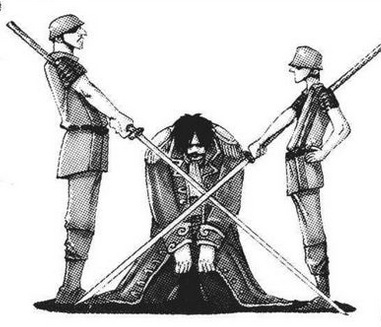
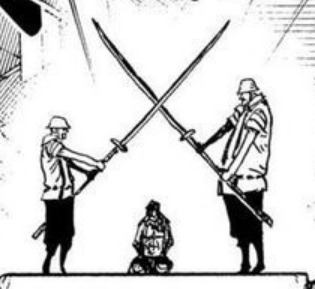
(chapters 1 and 569)
In contrast to Ace, look at Sabo. Ace is Firefist (火拳) but Sabo is Flame Emperor (炎帝), and I think that distinction is important. As far as I could find out (better speakers can correct me), 火 is used for fire in a more general sense, while 炎 is used for the actual image of a burning fire, or a more intense fire. Sabo, Chief of Staff of the Revolutionary Army, is a much more concrete and pressing danger than Ace ever was.
As a side note, the move Sabo uses in Dressrosa in chapter 743 is called Dragon's Breath (竜の息吹). 息吹 means breath, but also a sign (of something new and fresh), or a breath (of spring, fresh air, etc).
In the end, Sabo is the one who is bringing a "breath" of change into the world. He is the one who inherited Ace's fruit and Dragon's Will and fanned the flames of Revolution. Sabo may not be a D., but he carries two of their Wills. He is the one who is turning the smoldering sparks of rebellion into an inferno, he's the one who is actually threatening the World Government.
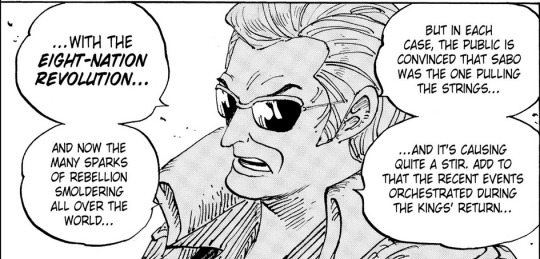
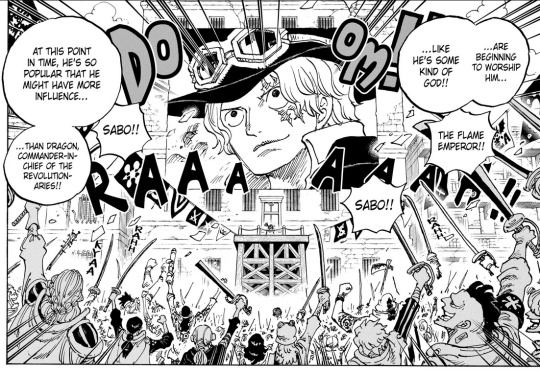
(chapter 1054)
(Also, seeing Ace die was the trigger for Sabo to recover his memories and eventually go after the Mera Mera Fruit. So, in a sense, it's an interesting bit of cosmic karma that the World Government ended up lighting the flames of their own hellfire.)
Fire links all three brothers, actually. Their lives were all changed by the fire at the Gray Terminal that ultimately drove Sabo to run away, lose his memories and join the Revolutionary Army. That loss caused Ace and Luffy to honor Sabo's apparent death and promise to live with no regrets and caused Ace to promise Luffy that he would never die.
Luffy ended up being the one to inherit Roger's Will along with Ace's. Whitebeard even explicitly tells Teach that Teach isn't the one Roger was waiting for, then cuts to an image of Luffy:

(chapter 576)
You can sever Gol D. Roger's bloodline, but not the flames of their Wills. What he says in Japanese is
炎が消える事はね - flame isn't/won't be extinguished
It's worth noting that the kanji for Vegapunk's Mother Flame (chapter 1116) is
消えない炎 - undying flame
消えない is the negative form of the verb 消える, which means to disappear/vanish, but also to go out (of a fire or light), to fade (of a feeling), to be lost or die out. So the Mother Flame is "undying" in the sense that it will not disappear, but also in the sense that it will not fade from memory or be lost to the world
The phrasing is different, but both the name of the Mother Flame and what Whitebeard said use the same words and mean the same thing.
Likewise, Roger's and Ace's Wills are undying, they will not disappear or fade away.
Luffy and Sabo will carry the flames that continue spreading change (hellfire, to the ones in power) to the world.
#lmao i think analyzing that panel from chapter 1138 broke something in me#that and way too many years writing literature analysis essays in college#i might as well just start making video essays at this point#(god forbid)#anyway again this got way too long#and i didn't even mention the other fire themes like the light of shandora and stuff#one piece#op meta#gol d roger#portgas d ace#monkey d luffy#revolutionary sabo#deb talks
90 notes
·
View notes
Text
If I had unlimited money I don't think I'd ever leave a college classroom. Send me back. I wanna talk about themes and motifs
#bro i'm so sad my college didn't have a philosophy class ToT#i would have been BALLING in that#need a literature class too#smth more in depth than the ones I took#i miss writing essays#i literally love doing them#i love getting to prove my point#because I'm Always Right (/j)#also the comradery#miss that#text post
59 notes
·
View notes
Text

29.03.2025—been an absolute failure of a week, but trying to ignore the past and focus my energy on doing well in the present
#studyblr#studyspo#study notes#study motivation#bullet journal#study blog#athenastudying#stationery#studying#study#heydel#heydeguy#heykenzie#dark academia#academic#academia#heytherecee#heyfsc#heycoral#heybenni#heymissawesome#heyosh#gradblr#phd#coursework#essays#writing#aesthetic#productivity#college
191 notes
·
View notes
Text
We ask your questions so you don’t have to! Submit your questions to have them posted anonymously as polls.
#polls#incognito polls#anonymous#tumblr polls#tumblr users#questions#school#high school#college#essay#essay writing#polls about school#homework#submitted nov 9
496 notes
·
View notes
Text




ok king! serve in your big jacket!!
#NO CAUSE I LOVE THIS JACKET#ITS MY FAV FIT FROM THE MV#IT GIVES KIWIIII IM SCREAMING#(kiwi lovingly)#my only kiwi#this is def what my username meant!!#NO BUT THIS ICON???#I CANT HE ATE THIS DOWN#can you guys tell im losing it???#my tags are only gonna get longer#GENUINELY SCREAMING OVER THIS IN CALL RN#THE FIRST PIC SPECIFICALLY#I FEEL LIKE I GOT SHOT#CUTIE PATOOTIE#i could write a essay about this actually#a college sized essay#with extra words to sound smart n all#a google slides being made for him rn#brain rot pulling out the pointer#yall my sister watched me make this ima cry#5sos#5 seconds of summer#michael clifford#michael 5sos
64 notes
·
View notes
Text
How does it truly end🥲🥲🫠
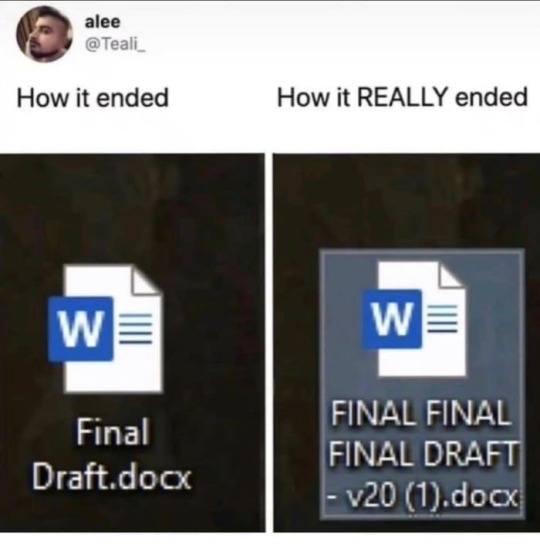
#college#college life#student#study#studying#university#student life#study space#study hard#exam stress#my wriitng#writer problems#essay writing#writers on tumblr#writing#final exams#funny jokes#funny pics#funny videos
559 notes
·
View notes
Text
Only ten minutes in to Shanspeare's girlhood video (please check her out if you haven't already) and it's just got me thinking.
I never had this phase of girlhood that these girls and women are nostalgic for. I didn't have friendships where we did each other's make up and talked about boys, and I frankly always felt I was quite bad at even just being a girl. I didn't and couldn't do makeup, I couldn't do my own hair, and whenever I participated in trends/femininity it felt like I was playing catch-up. So none of this "girl blank" stuff is freeing for me because it's frankly foreign.
Also, the positing of femininity as uniquely freeing or pure does not resonate with me for the aforementioned reasons and because I am transgender. Being traditionally or stereotypically feminine feels and is restrictive for me, it doesn't better my life and in any way and being feminine no longer feels like catch-up; it feels like baring my throat to appease.
The trend of "I'm just a girl" turning to "you're actually not just a girl, you're the reason I believe in friendship" was a refreshing one, but it ignores the, to me, very real reality of "you're actually not just a girl, you bullied people in secondary school". The idea that womanhood, girlhood, and femininity are uniquely pure and divine is yet another harmful example of gender essentialism and cannot coexist with transgender and intersex discussions. As long as girlhood is portrayed as the better choice, trans men, transmascs, and all people who move away from it will be viewed negatively, like traitors. There is no "better" gender and we cannot cling to childish ideals forever; you have to grow up and let your views of gender, sex, and society shift and develop.
#hero hazards#hii can you tell i miss writing essays in college. anyway I'm going back to the video now#transandrophobia#< kind of? this is a very surface level off the dome post#but i also don't want it to seem like i hate girlhood! i liked being a girl i love being friends with girls and have very fond memories of#being a girl‚ specifically a fangirl and the communities i found around that. it's a nuanced topic and this post is not meant to be cover#every nuance and facet of this topic. i am just talking 👍
145 notes
·
View notes
Text
Jenson button photos that i’ve only just seen that i think need to be shared with the world pt 1 / ????
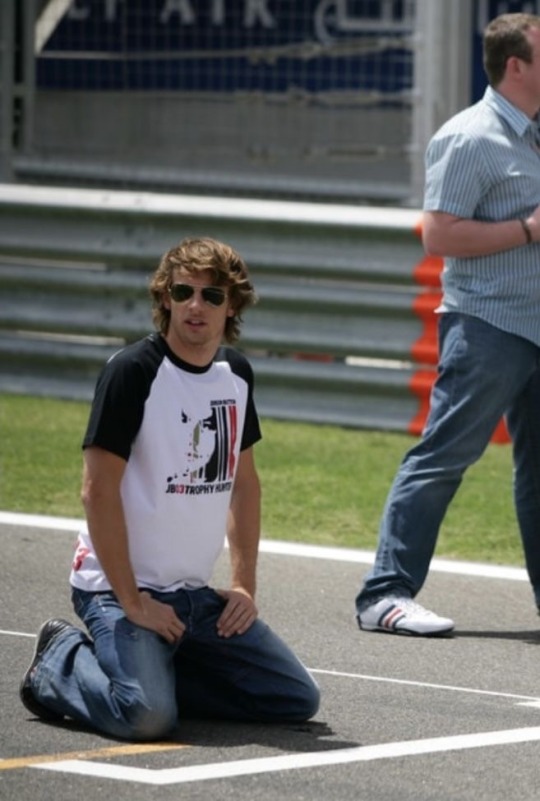

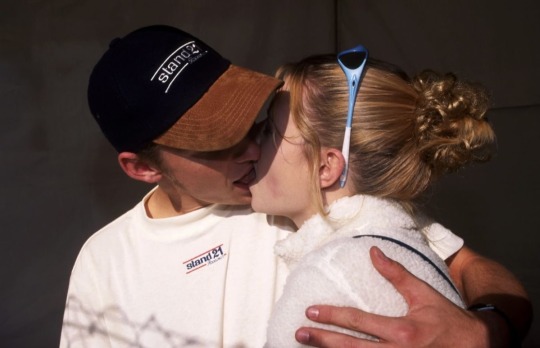
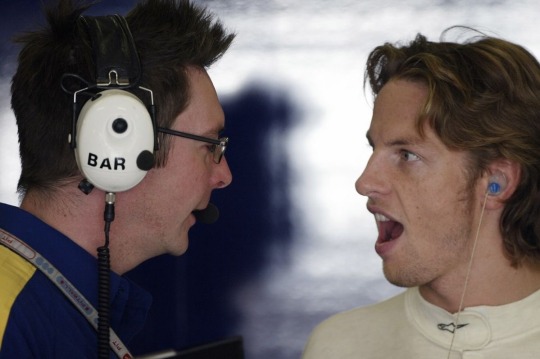
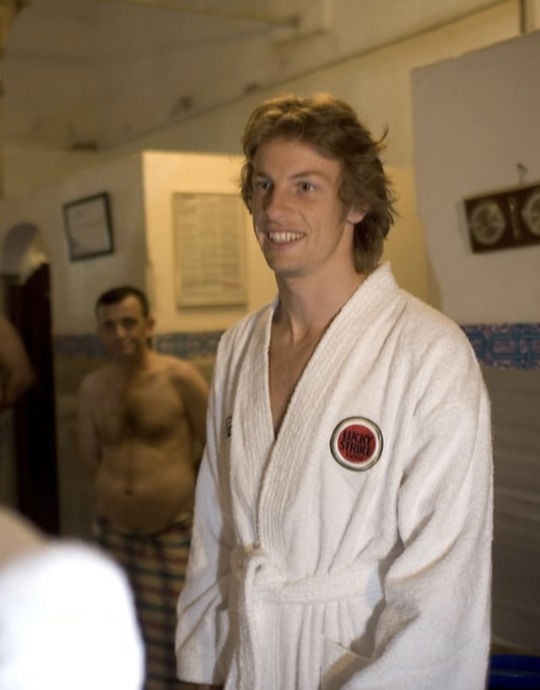

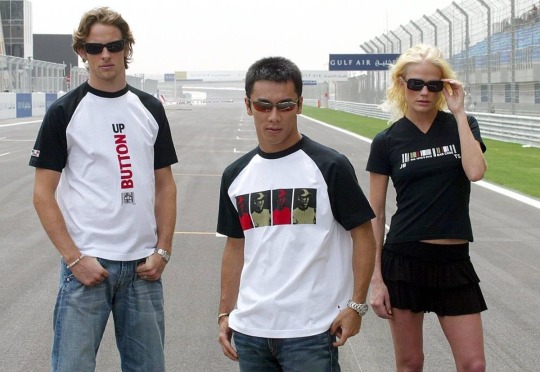

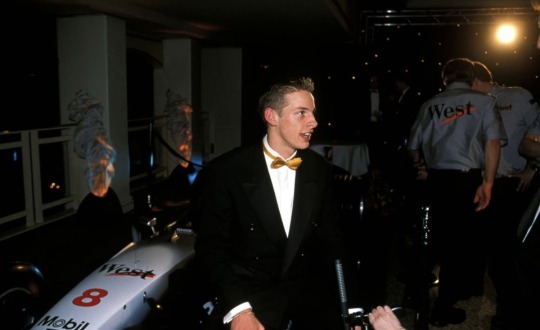

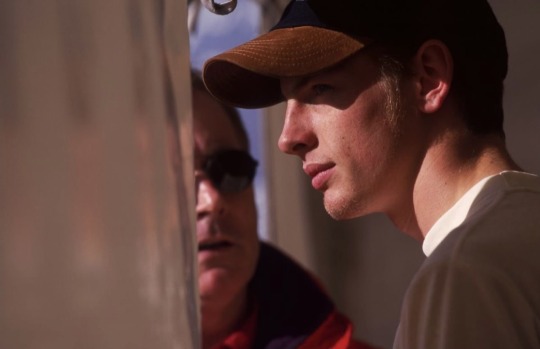


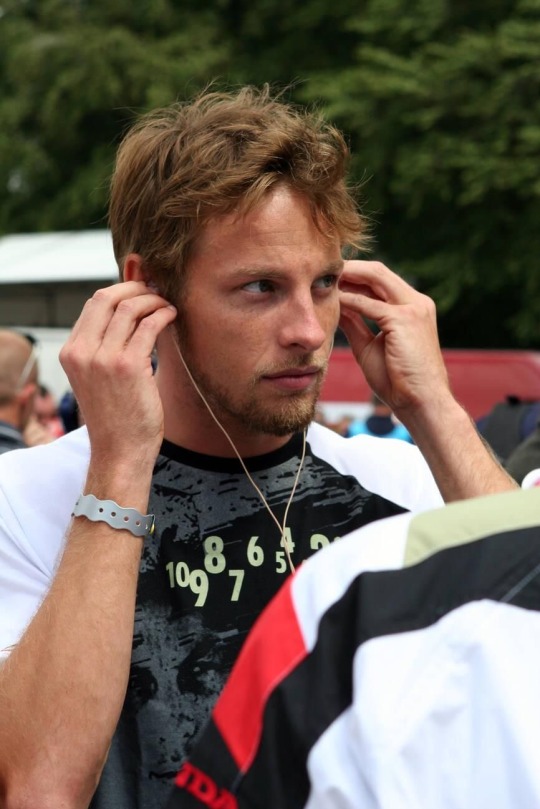
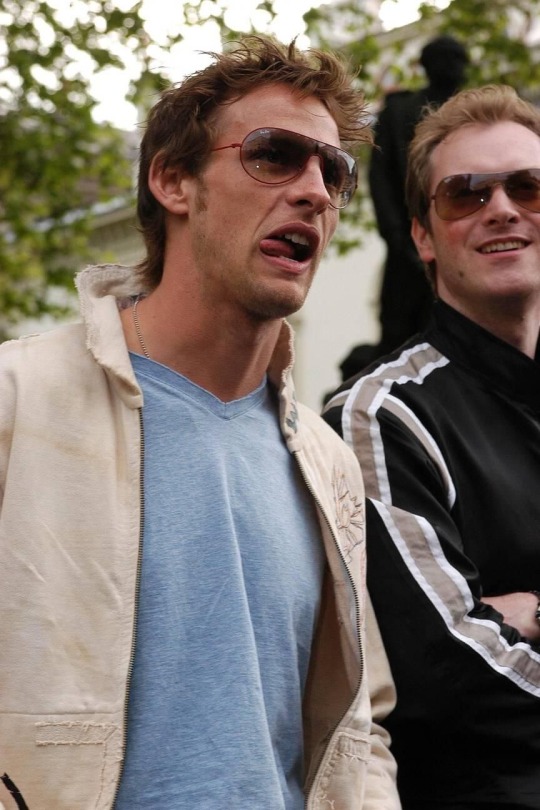
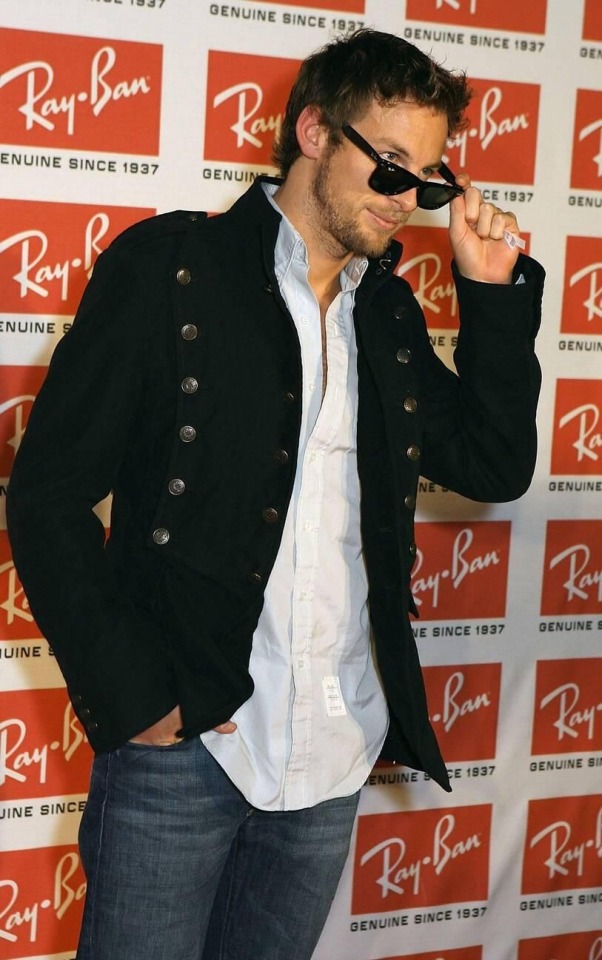

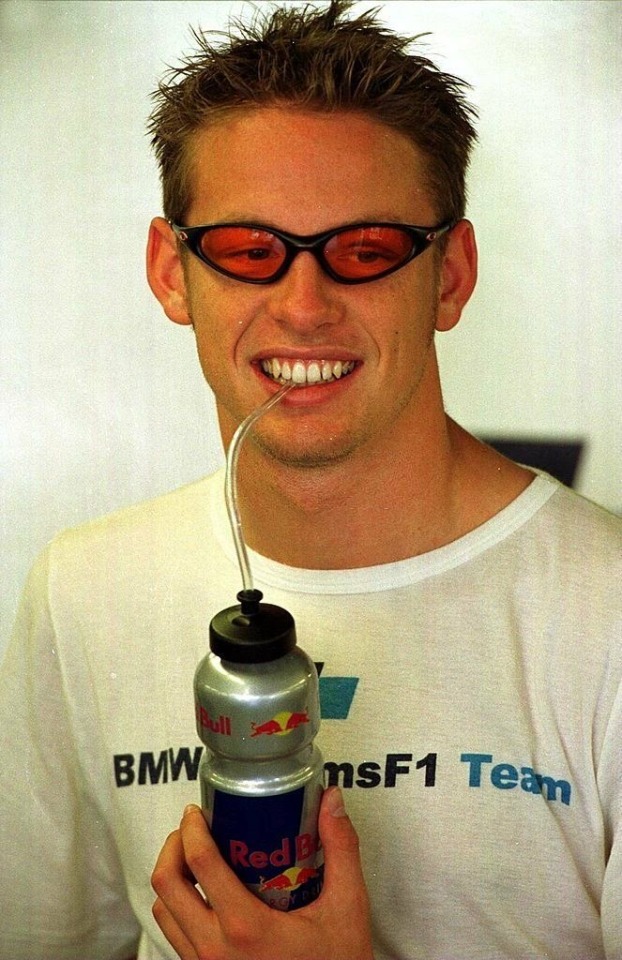


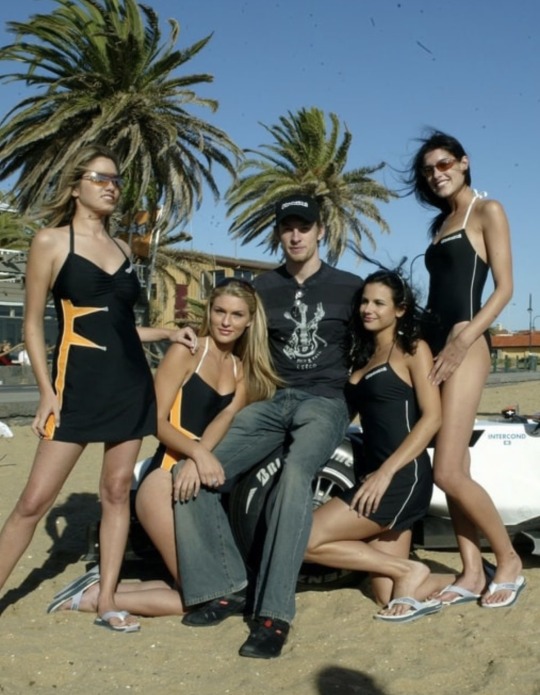
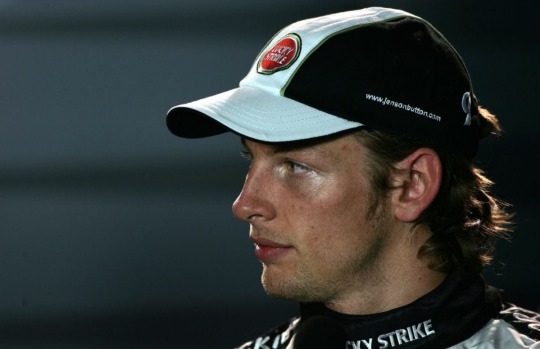
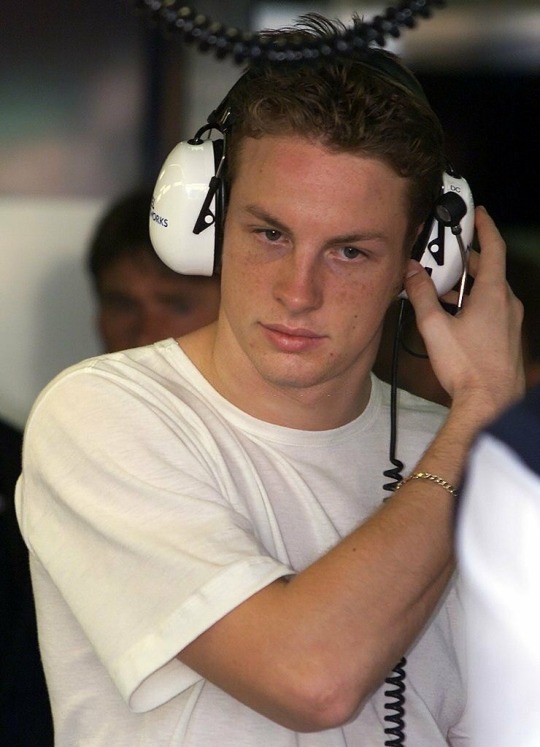
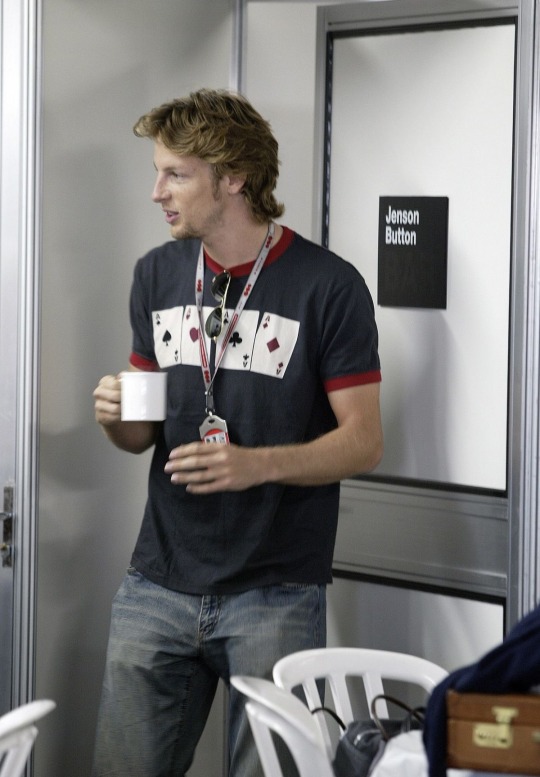
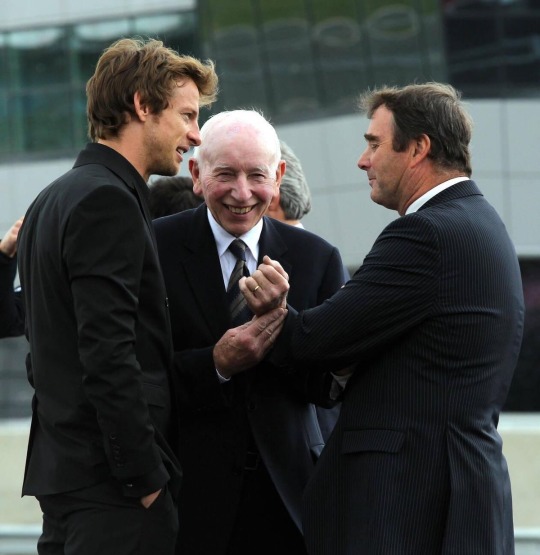
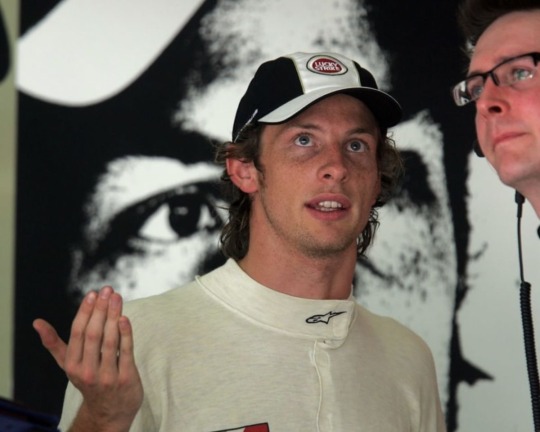

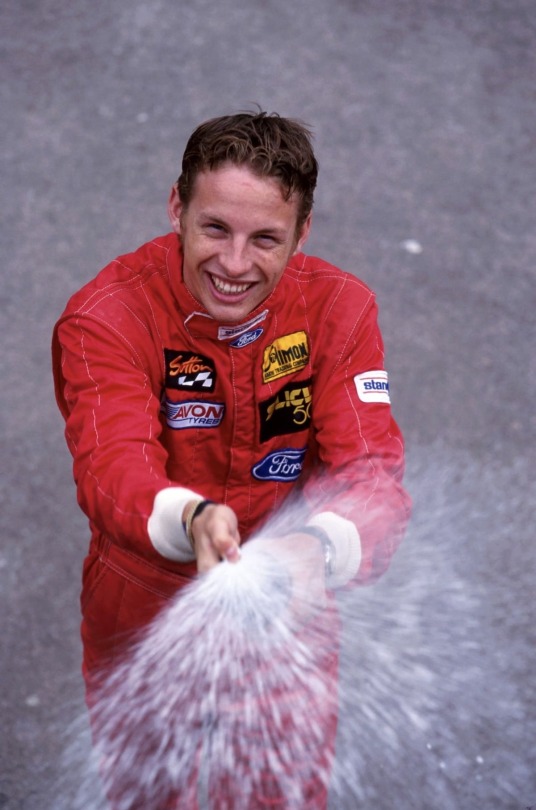
#i could write an essay on each of these photos but alas.. i have so much college work to to…. the world is so cruel to me 💔#jenson button#f1#formula 1#jb22#formula one
460 notes
·
View notes